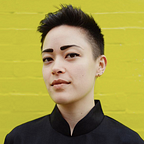My Queer Skincare Secrets
Taking Accutane as a queer woman means being doubted and disbelieved
 My skin is so clear it almost glows. I am a poreless moonbeam, a Glossier hunk, the epidermal equivalent of quartz. I am proud of this otherworldly sheen, but it is in no way natural.
My skin is so clear it almost glows. I am a poreless moonbeam, a Glossier hunk, the epidermal equivalent of quartz. I am proud of this otherworldly sheen, but it is in no way natural.
People often ask me how I got my skin to look this way. Is it a serum, an exfoliant, or a retinoid? Do I jade roll, sheet mask, or double cleanse? My answer always disappoints.
My skin is beautiful because it was artificially engineered, the culmination of seven months of pregnancy tests, sobriety, muscle aches, and insane amounts of Vitamin A. It was the result of a grueling seven months spent on Accutane, the now-defunct brand name of isotretinoin — the final line of defense against acne. There is nothing else in the world like Accutane. It is a miracle and a nightmare.
There is a common Accutane story: people talk about how hard it was for their skin to look bad — so oily, and bumpy! — and, then, how suddenly wonderful it felt for their skin to look good. They talk about how nothing worked, absolutely nothing, for so many years, until this drug of last resort swept in like a medical deus ex machina. They write about the purge phase, where the gunk inside your pores crawls out, lemon-yellow caterpillars that you must remember to…
